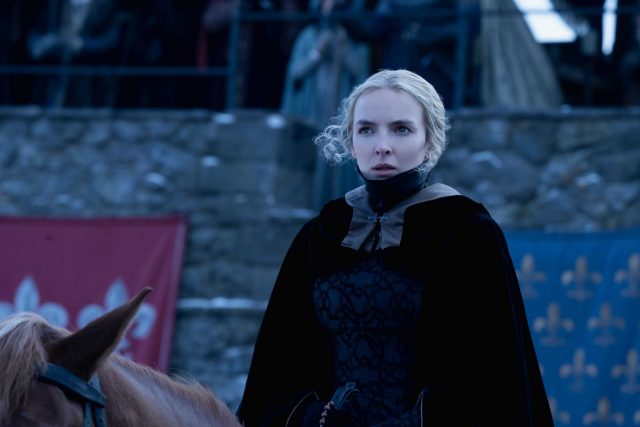The Last Duel, starring Matt Damon and Adam Driver, tells the story of the fatal duel between knight Jean de Carrouges and squire Jacques Le Gris in 1386. While the film might appear to be Hollywood fiction, it is actually based on accounts of what happened following a heinous assault on Carrouges’ wife.
A once-strong friendship dissolves
Jean de Carrouges and Jacques Le Gris met as vassals serving the baron, Count Pierre d’Alencon. However, their relationship soured after the count began showing favoritism toward Le Gris, showering him with gifts of money and land.
In 1384, Carrouges was married to his second wife, Marguerite, and the pair were in attendance at a party held by a mutual friend of Carrouges and Le Gris. The latter was also there. It appeared the two men had resolved their issues, greeting each other with an embrace and Carrouges asking Marguerite to kiss Le Gris “as a sign of renewed peace and friendship.”
Whether the two had actually ended their dispute is still debated.

Le Gris became attracted to Marguerite following their encounter. In January 1386, Carrouges was knighted, after which he traveled to Paris to secure some desperately needed funds. Marguerite was to stay behind with her mother-in-law at her family’s chateau in Capomesnil. For Le Gris, this was the perfect opportunity to seduce his foe’s wife.
Accusations of a heinous crime
On January 18, 1386, while Carrouges was away, Marguerite received a knock at the front door. She was alone, as her mother-in-law and servants were away on an errand. When she opened the door, she was greeted by Adam Louvel, Le Gris’ courtier, who talked his way into the chateau by asking if he could warm up by the fire.
Once seated, he spoke of Le Gris’ attraction to Marguerite, saying, “The squire loves you passionately, he will do anything for you, and he greatly desires to speak to you.” Before Marguerite had a chance to rebuke the courtier, Le Gris came up behind her, forced her up the stairs and assaulted her.

Following the assault, Le Gris issued a warning. “Lady, if you tell anyone what has happened here, you will be dishonored. If your husband hears of it, he may kill you. Say nothing, and I will keep quiet too.” Not put off by Le Gris’ threats, Marguerite said she would not keep what happened a secret. This merely aroused a laugh from her attacker, who tossed a sack of coins toward her and said his friends would provide him with an air-tight alibi.
Carrouges returned home three or four days later. When the two were alone, Marguerite informed him of what Le Gris did and urged her husband to seek vengeance. As a woman, she was barred from bringing a case against Le Gris, meaning she had to rely on Carrouges’ trust of her word.
Calls for a duel
Carrouges brought the news of Marguerite’s rape to Count Pierre, but his words were dismissed. Le Gris had a strong relationship with the count, who argued Marguerite had merely dreamed up the assault.
Not deterred, Carrouges petitioned the French court, asking for a judicial duel – a trial by combat. Known as the “judgment of God,” these duels were believed to have a divinely ordained outcome, with the loser’s loss and death being proof enough of his guilt.

After months of investigation by the French courts, including Marguerite’s powerful testimony and a counter-witness by Le Gris, the Parlement of Paris decided it had no choice but to allow the duel to proceed.
For the most part, Marguerite was truthful in her testimony, only omitting the fact that she became pregnant not long after her assault. This was due to the fact that it was the mis-held belief of those in the Middle Ages that a woman could only get pregnant if she enjoyed a sexual encounter. Given the time, it was impossible for her to definitively prove whether she was carrying her husband’s child or that of Le Gris.
A duel to the death
The duel between Le Gris and Carrouges occurred on December 29, 1386. It was a highly publicized meeting, presided over by French king Charles VI. Marguerite stood on the sidelines, clad in black. She knew if her husband lost, she would be viewed as having lied about the sexual assault and burned at the stake.

Before the duel commenced, Carrouges gave Marguerite one last chance to change her story, saying, “Lady, on your evidence I am about to hazard my life in combat with Jacques Le Gris. You know whether my cause is just and true.” His wife held fast with her claim, responding, “My Lord, it is so, and you can fight with confidence, for the cause is just.”
There are five contemporary (or near-contemporary) accounts of the duel, one of which is from Le Gris’ lawyer, Jean Le Coq. It appears Le Gris was the first to draw blood, piercing Carrouge’s thigh with his sword. However, Carrouge’s fighting experience allowed him to quickly gain the upper hand, rebounding and knocking Le Gris to the ground.
Seeing Le Gris was unable to rise due to the weight of his armor, Carrouges called on him to confess to his crime. However, he refused, declaring, “In the name of God, and on the peril and damnation of my soul, I am innocent of the crime.” It was then Carrouges delivered the death blow, piercing his opponent in either his neck or thigh (accounts vary as to the exact location).

In accordance with Medieval tradition, Le Gris’ body was dragged to the gallows and hung as a final insult to his reputation. The duel would be the last held in Paris, but far from the final one to occur in Europe.
Reputation restored
Following his victory against Le Gris, Carrouges’ reputation and that of his wife were restored, earning them prestige and wealth. However, that didn’t stop some in France from continuing to doubt Marguerite’s claim. Such doubts continue to this day, with some historians suggesting that, instead of remaining with Carrouges, Marguerite retired to a convent out of shame.
More from us: Scenes From Historical Movies That Really Happened
Those from the Enlightenment also favored Le Gris’ testimony over Marguerite’s. This included Voltaire and Diderot, who decried his “barbaric and unjust trial by combat” was an example of “the supposed ignorance and cruelty of the Middle Ages.” There are many who argue against this line of thinking, viewing it as yet another way intellectuals have tried to change the events of history.
